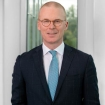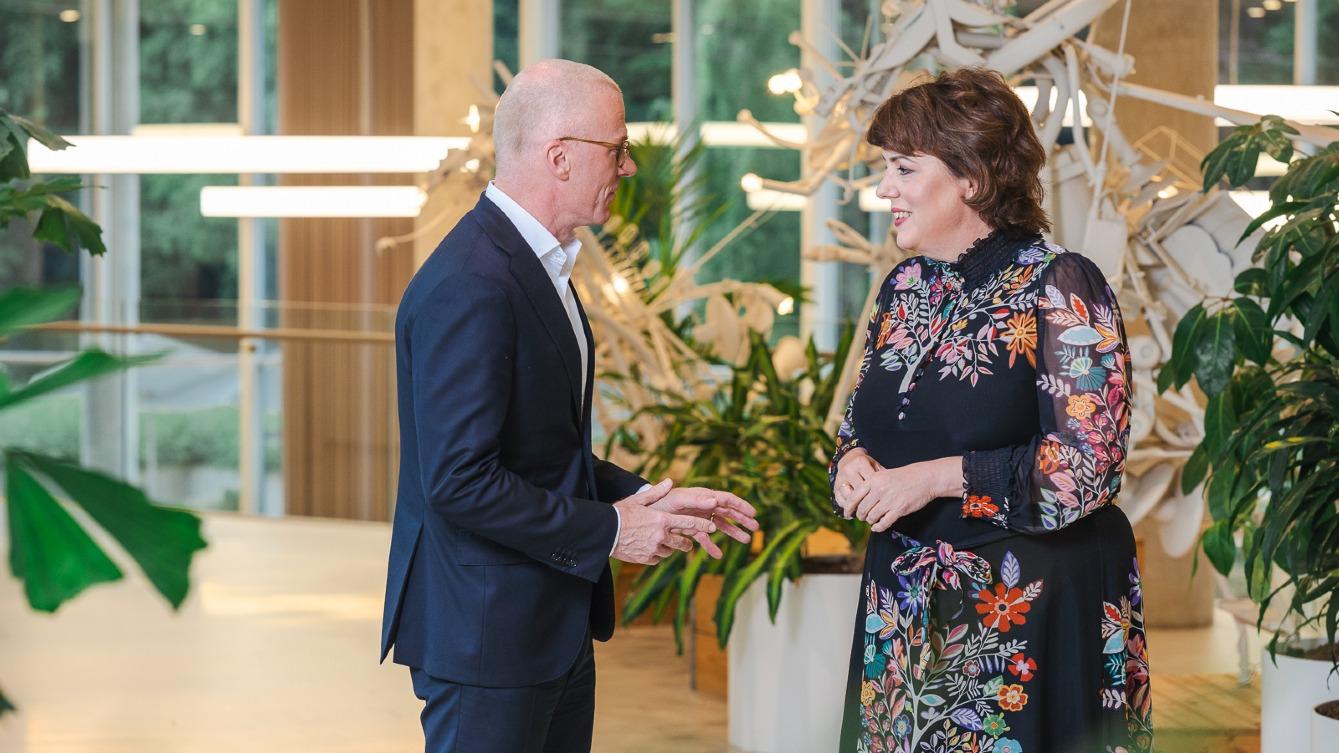Van Beek has led TenneT since 2018, overseeing electricity transmission in the Netherlands and much of Germany. At the firm’s headquarters in Arnhem, she notes that the workload has become larger than ever: 'We have an enormous amount to do.'
'We want to become less dependent on fossil fuels,' Van Beek explains, 'as well as more resilient in the current geopolitical crisis. In the past, being more or less ‘green’ was optional. But what everyone in this country wants right now is energy security for all Dutch citizens. If you want energy independence from other countries, there’s only one solution: you must act swiftly and decisively to make your own energy supply sustainable. The good news is that an incredible opportunity lies waiting, quite literally, on our own doorstep: the North Sea.'
'To me, the North Sea is the great green power plant. Not just for the Netherlands or Germany, but for all of Europe. So, amidst all the uncertainties we’re facing, acting on that is the best way to provide certainty and safety.'
Infrastructure paves the way
'This means it’s crucial that we build, build, build. We’re already doing that, also in the North Sea. But it’s equally important to strengthen the entire supply chain. I’m an advocate for hubs across Europe—locations dedicated to the production of materials for the energy transition. Think cable manufacturing, wind turbines, platforms, ships. It’s clearer than ever that the groundwork for building a new kind of economy is infrastructure. There is no energy transition without a network. Right now, we source these materials globally. We need to start producing them ourselves.'
'The great thing about this approach is that it’s a win-win. It can create hundreds of thousands of jobs, while also ensuring energy security. That’s important, because ultimately, strengthening our economy – our green economy, our competitiveness, our investment climate – is what matters. And in terms of investment climate, we should be genuinely concerned.'
'At the moment, there’s insufficient demand for green electricity. Because of that, wind farm developers are worried that their business cases won’t hold. This makes them hesitant to bid on new wind farm tenders. We’re all holding each other back.'
'It’s clearer than ever that infrastructure is the foundation to grow into a new economy.'
Manon Van BeekCEO TenneTStimulating green electricity
Van Beek proposes two concrete measures: tailored agreements with industry to stimulate demand for green electricity, and financial security for wind farm developers, to keep them investing. One way to achieve this is to work with two-sided ‘contracts for difference’ for wind farms—government-backed contracts that compensate when prices fall below a threshold and reclaim funds when prices exceed it.
The long-term roadmap is outlined in the Netherlands’ National Energy System Programme (NPE), which describes how the country intends to build a climate-neutral energy system by 2050. 'The point is, we’re now in a phase in which we must break through the current impasse. If we slow down now—and that’s what’s happening—we’ll not only miss out on obvious opportunities, but also face a very costly catch-up.'
'If we slow down now—and that’s what’s happening—we’ll not only miss out on obvious opportunities but also face a costly catch-up.'
Manon Van BeekCEO TenneTThe energy transition in a nutshell
PwC has long been a partner of TenneT, helping the firm to tackle the challenges Van Beek outlines, both strategically and operationally. This is clearly reflected in the Südlink project, a megaproject centring on the transportation of green energy from the North Sea to southern Germany.
'This project is really the energy transition in a nutshell,' says Paul Nillesen, PwC partner and TenneT relationship lead. 'Our team acts as a project consultancy, tackling challenges kilometre by kilometre. For instance, we’re directly involved in cable procurement, permit coordination, and financial oversight.' The high-voltage connection spans hundreds of kilometres, mostly underground, and carries the equivalent energy of several nuclear power plants (4 Gigawatts).
The project is a complex spatial planning challenge—crossing nature reserves, cities, and roads—and involves many partners. With over ten billion euros invested, it’s one of the most expensive energy infrastructure projects ever.
Van Beek: 'I see the energy transition as a path with many obstacles. In my view, we must not avoid these obstacles. On the contrary, we need to lean into and push through them, step by step. That’s why I expect the parties we work with to grasp the bigger picture, and to demonstrate competence and courage—the courage to say: "Wait a minute, this can be differently, we can do better". What we ask of our own people, we also ask of our partners: to speak up, to challenge, and to improve together.'
'The Südlink project is the energy transition in a nutshell.'
Paul Nillesenenergy expert at PwCThe energy system of the future
'Südlink requires a very strong partner, because such a route only works if everything works. PwC helps us make complex problems simple—but not simplistic. What’s needed is vision. A vision for the energy system of the future.'
'Connection is just as important. I don’t care whether you’re from TenneT or a partner. What matters is the spirit: we must realize Südlink. That you feel jointly responsible for the outcome. That’s the mindset I expect. We need PwC because we lack the capabilities they bring. And that’s fine. You’re strong when you recognize your own vulnerabilities and seek the right partner. Of course, there are sparks—it’s like a marriage. If everything runs smoothly, it’s not a good marriage.'
Nillesen: 'We're sparring partners. We treat each other kindly, but we’re not afraid to say when something could be better. Always with respect for each other’s work.'
Van Beek: 'I can always call Paul—like last year, in the middle of summer vacation. There was an emergency, and we had to deliver a strategic plan in record time. ‘I need you now,’ I said. And I know: you can do it, with the right people. ‘I need those people, and it has to be ready in three weeks,’ I added. And it worked. That’s the kind of partnership I mean.'
Contact us

Energy - Utilities - Resources Industry Leader, PwC Netherlands
Tel: +31 (0)61 003 87 14
















